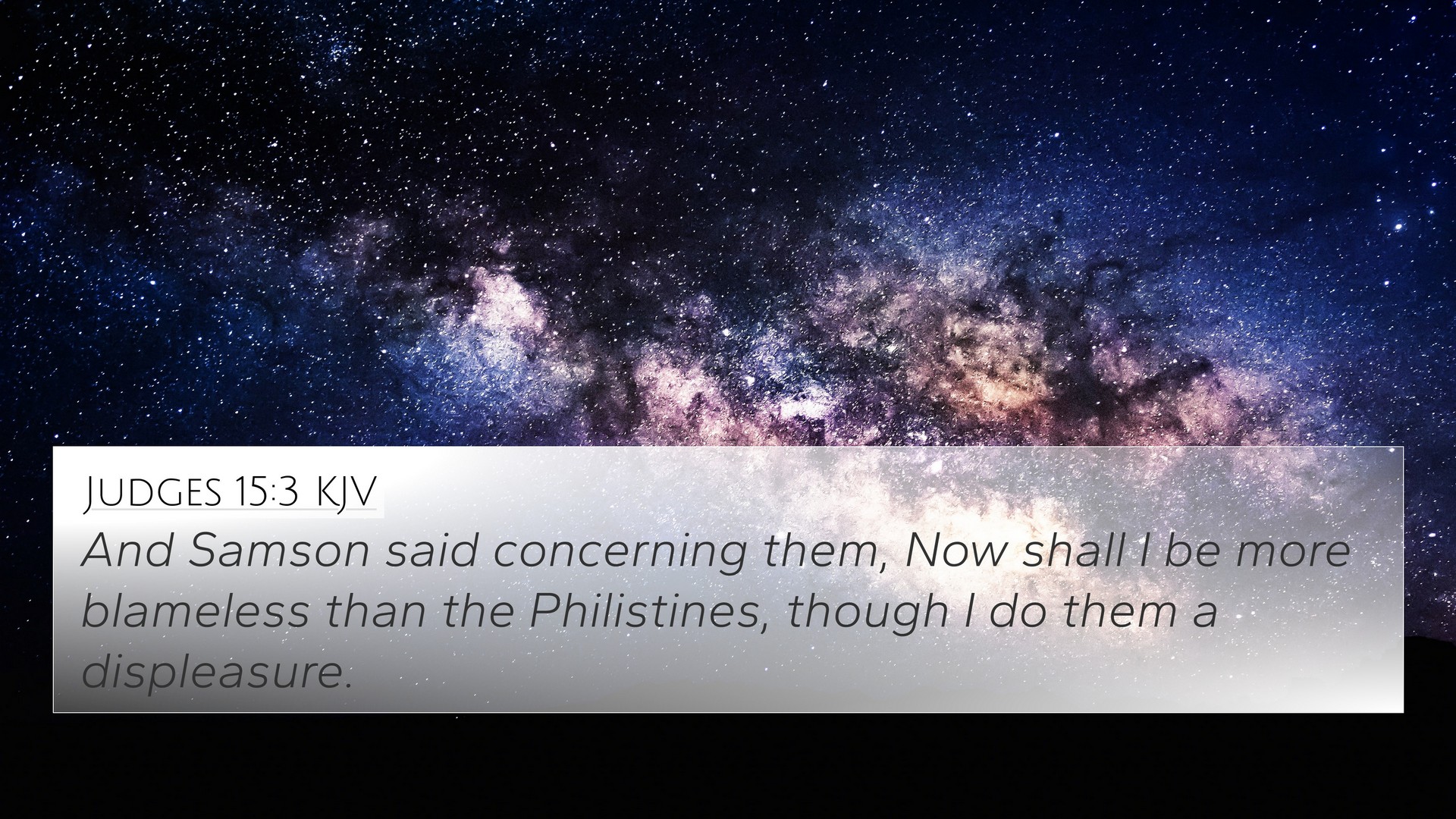Old Testament
Genesis Exodus Leviticus Numbers Deuteronomy Joshua Judges Ruth 1 Samuel 2 Samuel 1 Kings 2 Kings 1 Chronicles 2 Chronicles Ezra Nehemiah Esther Job Psalms Proverbs Ecclesiastes Song of Solomon Isaiah Jeremiah Lamentations Ezekiel Daniel Hosea Joel Amos Obadiah Jonah Micah Nahum Habakkuk Zephaniah Haggai Zechariah MalachiJudges 15:3 Similar Verses
Judges 15:3 Cross References
And Samson said concerning them, Now shall I be more blameless than the Philistines, though I do them a displeasure.
Uncover the Rich Themes and Topics of This Bible Verse
Listed below are the Bible themes associated with Judges 15:3. We invite you to explore each theme to gain deeper insights into the Scriptures.
Judges 15:3 Cross Reference Verses
This section features a detailed cross-reference designed to enrich your understanding of the Scriptures. Below, you will find carefully selected verses that echo the themes and teachings related to Judges 15:3 KJV. Click on any image to explore detailed analyses of related Bible verses and uncover deeper theological insights.

Judges 14:15 (KJV) »
And it came to pass on the seventh day, that they said unto Samson's wife, Entice thy husband, that he may declare unto us the riddle, lest we burn thee and thy father's house with fire: have ye called us to take that we have? is it not so?
Judges 15:3 Verse Analysis and Similar Verses
Understanding Judges 15:3
Judges 15:3 states: "And Samson said unto them, Now shall I be more blameless than the Philistines, though I do them a displeasure." This verse encapsulates a moment of Samson's emotional and spiritual turmoil as he grappled with his position regarding the Philistines and his own actions.
This passage requires careful examination for a deeper understanding, drawing insights from public domain commentaries, which delve into the historical and thematic elements of the verse.
Summary of Insights
-
Motivation Behind Samson's Words:
Henry's commentary emphasizes that Samson, a judge of Israel, expresses his intention to take action against the Philistines—not out of sheer revenge but as a means to assert his honor and justify his righteous indignation.
-
Understanding the Philistines:
Barnes highlights that Samson's acknowledgment of the Philistines’ hostility becomes a focal point for understanding Israel's conflicts. The Philistines represented not only a physical threat but also spiritual opposition to God's people.
-
Samson's Complex Character:
Clarke stresses that Samson's motives reveal a deeper complexity. While he shows a desire for personal vindication, it also indicates how personal struggles can intertwine with national expectations and responsibilities.
Thematic Connections
This verse strongly connects with several themes found throughout the Scriptures:
-
The Theme of Vengeance:
Samson’s motivation reflects the broader biblical discourse on vengeance, recalling Romans 12:19 which states, "Vengeance is mine; I will repay, saith the Lord."
-
Divine Justice:
We see a motif of divine justice being enacted through individuals, akin to Isaiah 61:2 which speaks on the day of vengeance of our God.
-
The Conflict Between Israel and Philistines:
This conflict sets a backdrop so prevalent in the Old Testament, especially found in 1 Samuel 17 with David and Goliath, showcasing enduring opposition.
Cross-References for Judges 15:3
To further explore this narrative and its implications, one can consider the following cross-references:
- Judges 14:4 - Samson's appointments were often tied to divine purposes despite his personal failings.
- Judges 16:23-30 - Samson ultimately delivers Israel through his death, revealing themes of sacrifice and redemption.
- Psalm 37:13 - This verse reflects the foolishness of vengeance and alludes to God’s sovereign oversight; paralleling God’s justice in Samson’s context.
- 1 Corinthians 15:33 - "Bad company corrupts good character;" Samson’s interactions serve as a warning about influences that lead to moral falls.
- Romans 15:4 - The implication of Old Testament narratives continues to provide instruction and understanding for believers today.
- Hebrews 11:32-34 - Samson is recognized among the heroes of faith, reminding readers of God's ability to use flawed characters.
- 2 Thessalonians 1:6 - God is just, providing comfort in understanding that God balances justice and mercy.
Tools for Bible Cross-Referencing
For individuals interested in a comprehensive study of Bible verses, consider employing various tools for Bible cross-referencing:
- Bible Concordance: An essential resource for finding specific passages and related verses.
- Cross-reference Bible Study Guides: Help to uncover connections between different scripture texts, enhancing understanding and study.
- Comprehensive Bible Cross-reference Materials: Include tools that compile verses based on similar themes, sacraments, or narratives.
Conclusion
Judges 15:3 serves not only as a piece of historical narrative but also as a reflective lens for understanding themes of vengeance, justice, and personal integrity within the greater biblical story. The connections established through cross-referencing enable deeper explorations into the layers of meaning within the biblical text, allowing readers to draw parallels and insights from Samson’s experiences.


